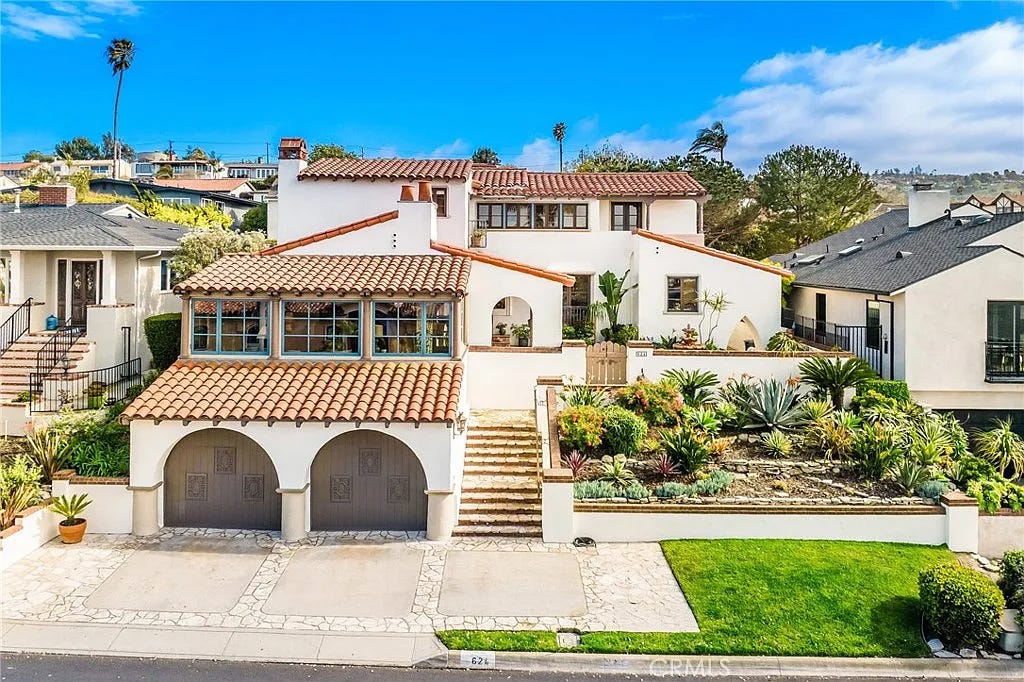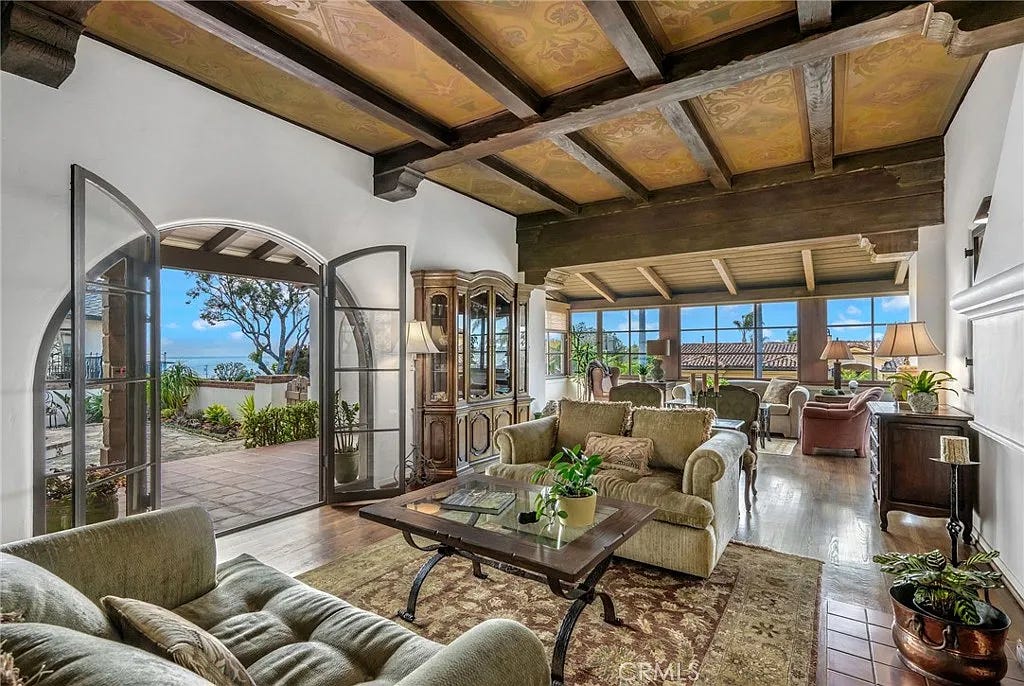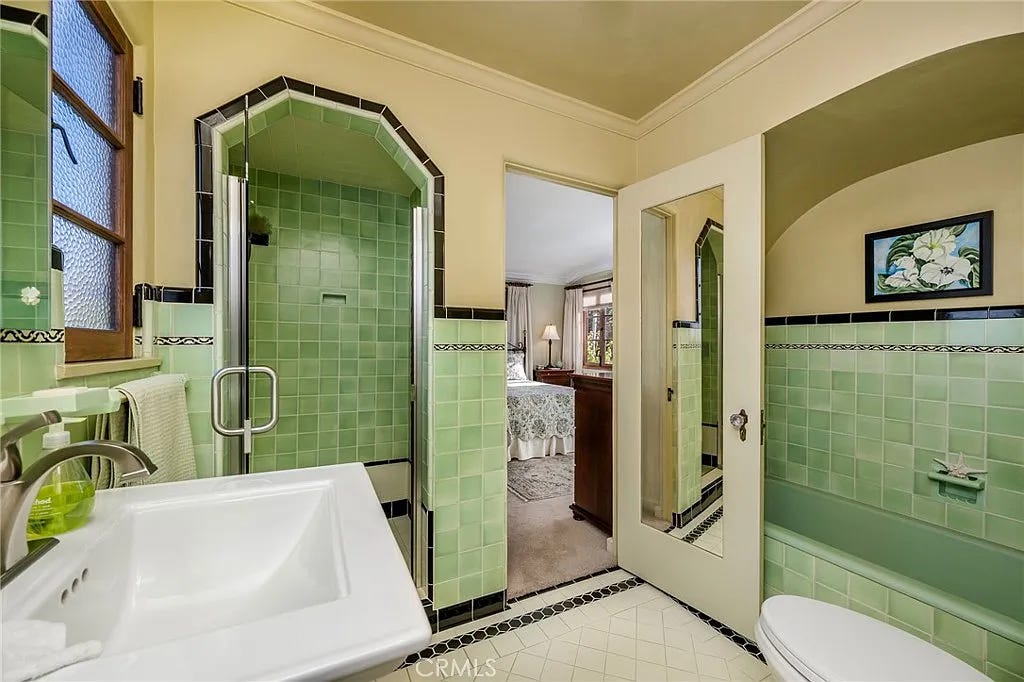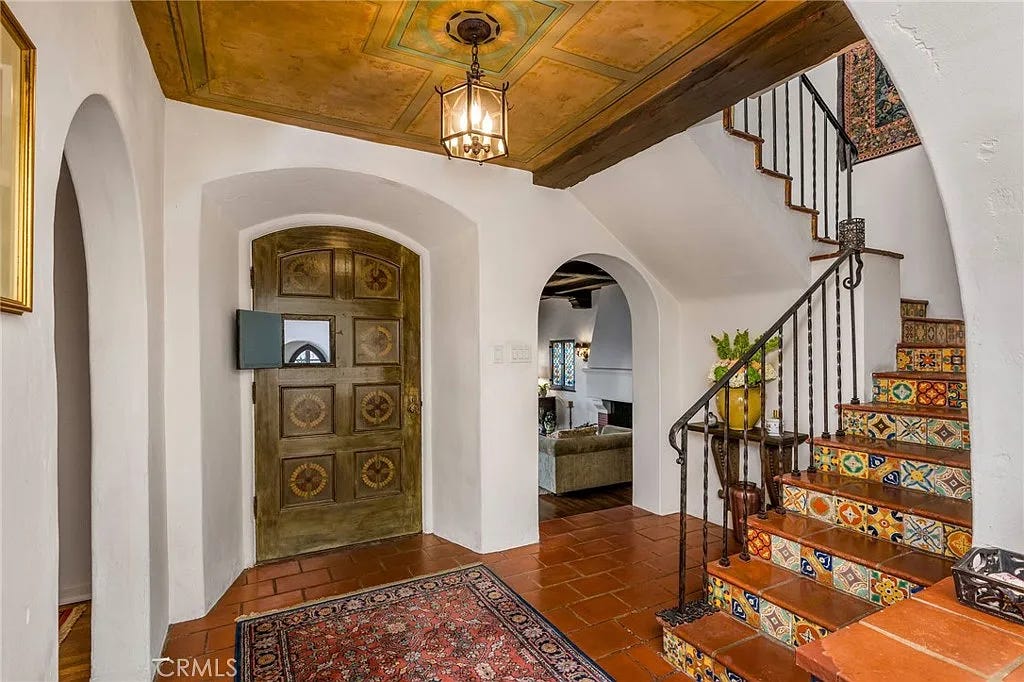There’s no place like someone else’s home
Is home dysmorphia holding you back from letting people in?

This week’s letter was edited, generously, by Eloise Porter.
Last week, my husband and I put an offer in on our dream home (not the one pictured above; I WISH). We promised each other we wouldn't get our hopes up. But slowly, hope crept in.
We started talking about which light fixtures we’d change. How the tile in the updated bathroom didn’t really match the house’s vibe, but we didn’t care. I became smitten with the wainscoting and real hardwood floors, a rarity in our area of southern LA, which is full of monstrous white Urban Farmhouses.
Reader, we did not get our dream home. We were handily beaten out by a buyer who went way over list. But you could have guessed that, right?
After we lost out on the house, I started wondering: Why have I been feeling so itchy to leave our perfectly good rental in a great location to “upgrade” to… a bigger house in a less great location? To have the real hardwood floors and maybe a paneled refrigerator? Why can’t I be content here, or even with a more modest, less picture-perfect home that’s possibly within reach?
I started blaming the usual suspects: It was Instagram’s fault, probably. Maybe I’d been spending too much time on Pinterest, pinning inspo to my “forever home” board. But as I thought more about it, I realized there’s another app lurking on my phone that’s also robbing me of my time and distorting my perception of what’s “enough.” It’s the app my finger gravitates to on my home screen, one I obsessively check to see what’s new, and one that is constantly feeding me unattainable standards for what a home should be.
That app is — hear me out — Zillow.
I know! I know. It’s so much fun to window shop on Zillow and get a peek into a stranger’s life. There’s just something about someone else’s space that is so exciting: You get an intimate peek at their taste, tidiness, priorities, quirks. Think of the curiosity that builds up before you step into a friend’s home for the first time. Exhilarating!
(Also: You probably Zillow their address before you go or when you leave. You do. Don’t lie.)
But most of the time, Zillow doesn’t give you those quirks — only synthetic taste and tidiness. Many of the homes on the market are wiped of all texture and color: old flooring covered by “luxury vinyl,” walls stripped of wallpaper and painted greige. Rooms staged by professional interior designers. Made for looking, not for living.
I’ve been doing a lot of thinking on my own relationship with this app, how it may be changing our standards and feelings for our own homes, and why it’s more critical than ever to spend time in the real homes of our friends and family.

Zillow surfing and a new thing to hate about ourselves
We were never meant to have this level of access to other people’s spaces. Think about the real estate landscape 10 years ago. Sure, you may have seen a home for sale while walking or driving around your town. But unless you were seriously considering buying it or popped into the open house, you could never see directly into that home. Especially if it was a multi-million dollar mansion.
We can now place ourselves into hundreds of thousands of homes of any price, picturing our daily lives there. What it would be like to have coffee on the little balcony off the bedroom. Read in that sunlit nook. Walk down the sensuously curved staircase. Host endless dinner parties in that perfectly appointed kitchen. Be chained up in that sex dungeon (have you seen Zillow Gone Wild?! This kind of home voyeurism I do endorse.).
When we live in this imaginary life, even subconsciously, it changes our expectations of our own homes and the spaces we aspire to inhabit.
A more sinister side to home peeping
It’s pretty clear that people aren’t just using Zillow to actively hunt for homes to rent or buy. The app had 204 million monthly users by the end of 2024, according to Zillow’s Q4 earnings report — a number nearly two-thirds of the U.S. population. As of this writing, Zillow is the 77th most-downloaded free app on the iOS App Store, leading the likes of Lyft, United Airlines, Waze, and Disney+.
The concept of browsing homes for fun, or “Zillow surfing,” isn’t new; in 2020, the New York Times wrote a story about the app’s ability to transport us out of our own homes and into others’ during lockdown. Zillow surfing may seem like an innocuous daydream escape, but it may be distorting our realities in a more damaging way — similar to seeing veneered appearances, parenting styles, and vacations on social media.
“People’s sense of self and sense of worth is, especially in materialistic cultures, heavily defined by what you buy, what you have, and the house that you own,” says Michael Karanicolas, Associate Professor of Law and James S. Palmer Chair in Public Policy & Law at Dalhousie University. “Getting this kind of close-up look at wealth absolutely impacts people’s satisfaction with their lives.”
Comparison is the thief of contentment
There are so many reasons people do this — and Inside Hook has a smattering of testimonies from Zillow browsers — but the effects on the looky-loos dream-shopping for homes they can’t afford are likely not great. Some see it as harmless entertainment and can separate the fun from their real living situation. For others, especially those priced out of homeownership, it can quietly become a source of anxiety. "A primary reason why people find themselves creeping on Zillow may be to compare their own life with the life of someone else's,” as psychologist Reena B. Patel says in a Pop Sugar story about Zillow voyeurism.
“You could argue that comparing yourself to your neighbors is inherent to the human condition,” says Karanicolas. “But like a lot of things, Zillow has turbocharged people’s ability to do that, and to do it further afield, in ways that may not be healthy.” TikTok and Instagram show you perfection. Zillow just shows you houses — that could be yours, if you had the money, you loser. Different platform, same problem. Scroll, compare, repeat.
What makes things worse is that homeownership is still the gold standard of “making it”— despite many headlines and think pieces urging us to abandon that as a life milestone — and for most of us, it’s completely out of reach, even with high incomes. I’d love to buy a home in the neighborhood where we currently rent, but with the current market, that’s probably not happening anytime soon. (Also worth saying: renting is just fine, and some even argue it’s the smarter financial decision!) For many of us who can’t afford even a “starter” home locally, this can stoke feelings of inadequacy (”why can’t I afford a house like this?”) or home dysmorphia, a non-clinical TikTok diagnosis (”my home isn’t enough, or good enough”).
Simply put: Long-term, Zillow surfing usually just makes you feel like shit.
Ditch Zillow and spend time in real homes
Once I realized that Zillow was flooding my brain with dopamine and then despair, I deleted it. It left me thinking about our real, actual homes. The spaces we truly inhabit. They’re never perfectly staged, pristine showpieces. Just like our bodies — to quote podcast host and Substack author Liz Moody — our homes are for living, not looking.
What I worry about is that feeling of not being good enough — mostly for ourselves, but also how we think others perceive us, and in turn, our spaces — and letting that get in the way of inviting people in. Gathering in others’ homes is life-giving. Yes, it can be a lot of work for the host, and yes, it can be a lot of work to just show up. But the simple act of letting others into our space, and being in others’ spaces, is a vulnerable, generous, and ancient practice. (I wrote about how we should do it more — and even show up to friends’ and family’s homes unexpectedly!)
And here’s the thing: The more time you spend in real homes, the more grounded your sense of “enough” becomes. There’s a name for this: the mere exposure effect. The more we see something, the more normal (and, potentially, desirable) it starts to feel. If you’re on a daily diet of Zillow listings, your expectations shift. But when your baseline is your best friend’s cute rental or your neighbor’s charmingly mismatched furniture, it’s a lot easier to remember what “enough” actually looks like.
Ultimately, what is the purpose of our home? To shelter us, to bring comfort and hopefully delight, and to welcome others in. Let’s do more of that, without the anxiety of our homes not being “enough.” Nobody’s ever enjoyed a dinner party because of the kitchen countertops and backsplash. They remember the conversation, the laughter, the feeling of being together. It’s corny as hell, but it’s true.
Forget the fantasy listings. The magic happens when you open the door and let people in.







Ohhh this is so good. I'm so sorry you didn't get your home, but as we talked about: It just wasn't the one. Which I know is such a dick thing to say but it really wasn't. And look what an amazing piece of writing came from it. Zillow is definitely the scourge and I agree that spending time in real homes with people you love is so much better.
Also better: estate sales. Getting a glimpse of real homes well-lived-in. These are homes that are almost too lived in. It's sort of another kind of dream home that has so many family stories and memories. They're usually old and worn and beautiful in a totally different kind of way. We go to estate sales all the time and I just love looking around and being part of the history: seeing what books they have in their bookshelves, old games, clothes, cookware. It's never shiny or pristine. And the reality is that all of the homes you see on Zillow turn into this through, as Elrond says in LOTR, the slow decay of time. And I don't even think that's a bad thing. It's kind of beautiful. Anyway, it's going to be wonderful for you, no matter where you end up. I know it.
I loooove home design and to subscribe to Architectural Digest and inhale a certain part of the design internet. I also love to have my home designed a certain way. What I continue to realize is that not everyone--especially not outside of big cities or certain design subsets--is living like that! And that's totally OK!!! What matters most is just figuring out a place that is cozy and comfortable for YOU and your family versus a home that is a certain aesthetic for the internet.